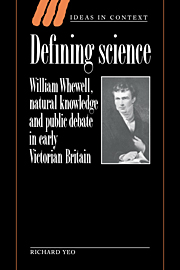3 - Metascience as a vocation
Published online by Cambridge University Press: 22 August 2009
Summary
…the philosopher is not an artificer in the field of reason, but himself the lawgiver of human reason.
Kant 1933, 658If this course educate a man for anything, it educates him to be a judge of philosophical systems; – an office which so few Englishmen will ever have to fill.
Whewell 1838a, 49Unlike Merz in 1896, Herbert Spencer, writing some fifty years earlier, believed that the definition of science was by no means a straightforward or finished matter. Indeed, in an essay review on ‘The genesis of science’, he questioned many of the conclusions of the two major scientific commentators of the age: Auguste Comte and William Whewell. To begin with, he claimed that both endorsed the dominant view that ‘scientific knowledge somehow differs in nature from ordinary knowledge’. This absolute contrast, in his opinion, removed the possibility of understanding the growth of science as a process of development on evolutionary lines. While welcoming Comte's efforts Spencer rejected his notion of a ‘serial’ progress of the sciences: scientific advance was ‘as much from the special to the general as from the general to the special’ (Spencer 1854, 108, 161). Furthermore, he argued that although Comte recognized a ‘common origin’ of the sciences, he wrongly presented the subsequent divisions as separate, overlooking the ways in which they interacted, forming new syntheses.
- Type
- Chapter
- Information
- Defining ScienceWilliam Whewell, Natural Knowledge and Public Debate in Early Victorian Britain, pp. 49 - 74Publisher: Cambridge University PressPrint publication year: 1993

